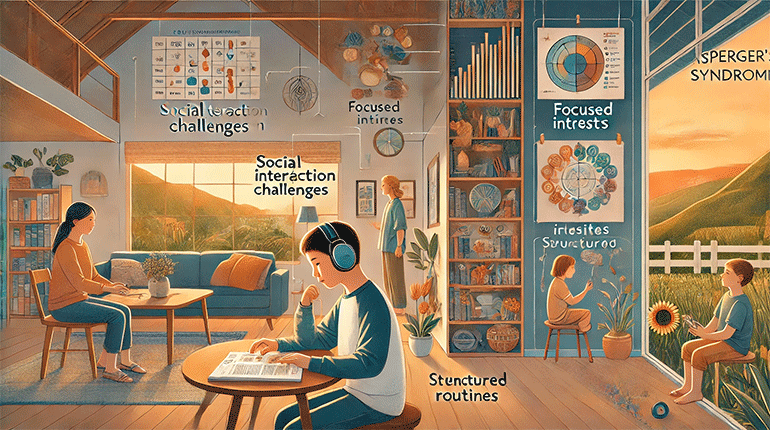Understanding Asperger’s Syndrome
Asperger’s Syndrome, a developmental disorder within the autism spectrum, is characterized by unique patterns of behavior and interaction. Though individuals with Asperger’s typically have average to above-average intelligence and no language development delays, they often face significant challenges in social and behavioral areas. Understanding these traits is essential to creating supportive environments and empowering individuals to thrive.
Key Characteristics of Asperger’s Syndrome
1. Social Interaction Difficulties
People with Asperger’s often experience challenges in understanding and navigating social situations. They may:
Struggle to interpret nonverbal cues such as facial expressions, gestures, or tone of voice.
Find small talk or casual conversation difficult or uninteresting.
Face difficulties forming and maintaining relationships, sometimes appearing socially isolated.
2. Communication Nuances
While language development is typically on par with peers, individuals with Asperger’s might struggle with:
Understanding sarcasm, idioms, or humor.
Maintaining the flow of conversation, often focusing on their interests without recognizing the other person’s perspective.
Speaking in a formal or monotone manner that can be perceived as unusual.
3. Intense Focus on Specific Interests
A hallmark of Asperger’s is the development of deep and intense interests in specific topics. These interests can:
4. Preference for Routine and Repetition
Individuals with Asperger’s thrive on predictability and structure. They may:
Show a strong preference for routines and rituals, experiencing distress if these are disrupted.
Exhibit repetitive behaviors or movements, which can serve as a coping mechanism for stress or sensory overload.
Asperger’s Syndrome and the Autism Spectrum
Asperger’s is part of the broader autism spectrum, which encompasses a range of conditions sharing core traits while varying in presentation and intensity. Understanding the position of Asperger’s within this spectrum helps clarify its unique aspects.
Shared Traits Across the Spectrum
Challenges with social communication and interaction.
Difficulty adapting to change or engaging in flexible thinking.
Sensory sensitivities, such as aversion to loud noises, bright lights, or certain textures.
Distinguishing Asperger’s
Language Development: Unlike other autism spectrum conditions, individuals with Asperger’s exhibit typical language milestones.
Cognitive Abilities: Intellectual functioning is often average or above average, enabling strengths in areas such as memory, logic, and analytical thinking.
Diagnosis and Management
Diagnostic Process
Diagnosis typically involves a comprehensive evaluation by a team of professionals, including psychologists, pediatricians, and speech or occupational therapists. This process may include:
Management Strategies
While there is no cure for Asperger’s, various interventions can support individuals in overcoming challenges and leveraging their strengths:
Behavioral Therapy: Focuses on improving social skills, managing behaviors, and fostering emotional regulation.
Social Skills Training: Teaches practical strategies for navigating social situations, such as making eye contact or interpreting body language.
Educational Support: Tailored learning environments that accommodate individual needs and capitalize on strengths.
Medication: May be used to address co-occurring conditions, such as anxiety, depression, or attention difficulties.
Embracing Unique Strengths
Individuals with Asperger’s Syndrome bring diverse perspectives and talents to the world. Their focus, creativity, and unique ways of thinking can lead to remarkable achievements when nurtured in supportive environments. By understanding and accommodating their needs, we can create a more inclusive society where everyone has the opportunity to succeed.

